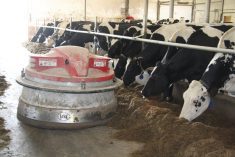BANFF, Alta. – When an eight-month-old baby arrived at the University of Alberta hospital with oozing skin lesions and overall poor health, a quick thinking doctor diagnosed the problem as a fatty acid deficiency.
“The mother had been feeding this kid Coffee Mate as the main source of nutrition and it has no essential fatty acids,” said University of Alberta nutrition researcher Tom Clendenin.
The child developed skin lesions because its immune system was unresponsive, making it susceptible to infections. While such deficiencies are uncommon, researchers like Clendenin have been looking at the connection between essential fatty acids and the development of infants for about 25 years.
Read Also

Manitoba extends Crown land rent freeze
Manitoba government links the continued rental rate freeze on grazing and forage leases to economic and environmental challenges facing the industry
“Essential fatty acids are absolutely crucial in preterm babies,” he said at an international egg symposium held in Banff April 20.
During the last trimester of gestation, a fetus has no reserve fat tissue and may be deficient in essential fatty acids at birth. This is a particular problem among underweight, premature infants.
Manufacturers of commercially prepared formula started adding these fats in 1998. The first country to adopt the new formula was the United Kingdom. North America was the last to adopt the revised mixture.
His research showed babies born at less than 35 weeks and weighing less than 1,500 grams show considerable improvement when supplemented with essential fatty acids. The next phase of research will include children one to three years of age.
Maria Maries of the Child Health Research Institute in Australia has been involved in lengthy infant nutrition studies and also found adding fatty acids like omega 3 to baby formula improved their health.
She and other researchers at the conference suggested offering omega 3 enhanced eggs to babies at weaning time.
While some pediatricians ban eggs for young children because of concern over allergies, other research shows they could benefit from four yolks of omega 3 eggs per week.
That benefit extends to nursing mothers, said Jung Sims of the University of Alberta. He patented the designer egg containing higher levels of omega 3 fatty acids. The laying hens are fed a diet that includes 10-20 percent ground flaxseed.
“Your body reflects what you consume,” he said. “It is a serious matter not to practise proper nutrition.”
Insufficient omega 3 appears to be associated with higher levels of heart disease, strokes, rheumatoid arthritis, inflammatory bowel disease, diabetes and some forms of cancer.















